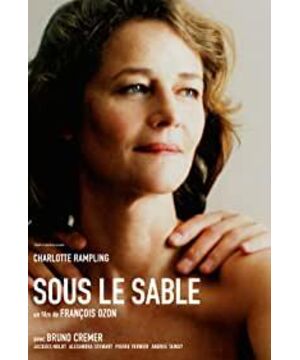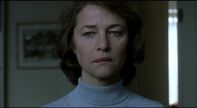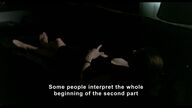As far as its style is concerned, [Under the Sand] is the same as another [Swimming Pool] that I like. In all of Ou Rong's works, it has its representative mystery, and its later works are more calm and calm, of course. There is also a momentary sensuality. In addition, the age of his creation is between the striking [dry firewood] and the quiet and elegant [swimming pool] (it seems that we have to put aside the [eight beautiful pictures] in 2002), which is usually regarded as a representative of Ou Rong. A transitional work.
This movie, which starts from the coast and ends at the seascape, is a mystery that runs through its beginnings and ends but is not yet clear. Accident. suicide. escape. Every subtle possible and inescapable psychological suggestion is Marie's lingering shadow.
Finally, Marie went to her husband's mother and told her that she thought Jean committed suicide due to depression, but the old woman flatly denied it. In fact, that should be the answer she was looking forward to. Deep down, she should not be able to accept the statement that the person closest to her ended her life for no reason.
However, the old woman's later words shocked Marie even more, and this was probably the fact that she had to admit.
Ou Rong said in the interview that the original plot setting was indeed to let Jean, who is in his sixtieth year, escape from his beloved wife and escape from life. That is probably the saddest result.
But the heart of the story is not the mystery. So it was never resolved.
After Jean disappears, Marie is in endless loss, and that's what the film is about.
Immediately after her husband's lost seaside vacation, the camera cuts back to Marie's life after she returns home, dressed to the point of a friend's dinner party. So that some of the episodes of Jean's reappearance made me think it was a memory.
Marie's seemingly unaltered life and unnoticeable grief was because she had convinced herself that Jean was still there. She came home in the middle of the night and fell asleep with her husband in her arms, but she was actually facing up alone in the dark. She did not have hallucinations, but lost her sense.
When she saw the young people in the rescue team in class, she was flustered. And Si Ding later denied everything to herself, and she lost her courage.
She recited Woolf's words repeatedly, knowing that after the female literati wrote them, she threw herself into the river. This was in refusing to forget Jean's sudden disappearance in front of the waves, and she lost her mind.
Vincent, who had spent a lot of fun together, finally proposed to let her get out of Jean's shadow, and this man was worthless in front of her.
The woman who had almost lost her soul, after a belated cry, looked up and saw a silhouette on the seashore in the distance.
She ran over. Maybe, maybe not running towards the back.
2007.8.
View more about Under the Sand reviews











